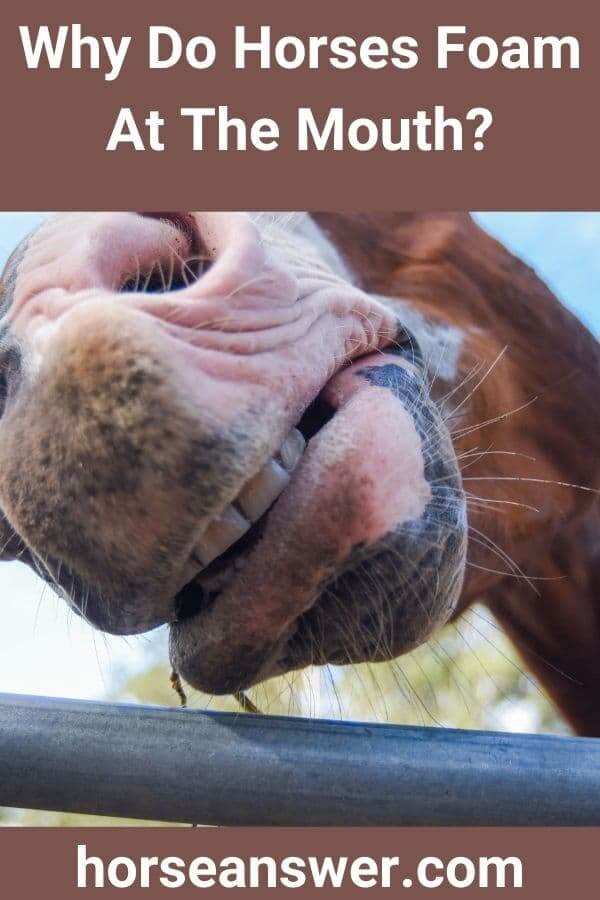Why Do Horses Foam At The Mouth? (Explained!)
The other day, after my dressage lesson, I was taking off my horse’s bridle when I saw he was foaming at the mouth.
Immediately concerned something was wrong with him, I went to my trainer and explained what I had seen.
She reassured me it was nothing to worry about but couldn’t tell me why it happened.
After that, I decided to find an answer to the question, “why do horses foam at the mouth?”
Horses foam at the mouth due to excess saliva mixing with an existing substance called latherin. Although common in working horses, foaming at the mouth is sometimes caused by a more serious issue. It is important to monitor your horse, to know if you need to take action.
We now know that latherin is responsible for the foam in a horse’s mouth, but what is latherin, and why does it create foam when mixed with saliva?
Can only working horses foam at the mouth?
How do I know if the foam is something more serious?
For the answer to these questions, and more, don’t wait for another second; keep reading!
What Is Latherin?
Latherin is a protein-packed enzyme located in a horses’ mouth that helps increase the saliva’s ability to penetrate dry foods.
Horses produce up to ten gallons of saliva a day and have the ability to increase production, depending on the food they’re eating.
If a horse has a meal full of dry food like pellets, it will increase its saliva output which mixes with the latherin.
As the horse chews, air bubbles are created, bonding with the latherin enzyme and creating foam.
This action is similar to rubbing soap between your hands.
The more friction there is, the more bubbles, or foam in a horse’s case, are created.
Every horse has latherin present in its mouth; it just takes the rubbing action to make the foam.
The horse doesn’t have to be eating to produce foam, and it can be a good or bad sign.
Knowing how to tell the difference can be life-saving for your horse.
When Is Foaming Good?
As stated, horses often foam at the mouth when they’re eating.
If you notice your horse’s mouth is foaming, take a quick inventory of their food.
It is perfectly fine if it consists of pellets, hay, or dry forage and your horse isn’t showing signs of distress.
In fact, the foam shows your horse’s digestive system is working.
There are also times when riding where foaming shows a relaxed, happy horse.
Horses who have their head in alignment and are comfortable will often happily chew on the bit, especially during dressage.
This chewing motion creates friction that produces foam.
If you aren’t hard on the hands, and your horse isn’t fighting you, you can be sure it enjoyed the ride as much as you did if you see a foamy mouth on dismount.
When Is Foaming Bad?
Although generally harmless, there are times when foaming at the mouth can be a worrisome sign in horses.
If you’ve inspected your horse and don’t believe one of the above reasons is responsible, it’s time to take a deeper look at what may be going on.
Anxiety And Stress From Riding
If you finished a tough lesson and your horse was fighting you, you may notice an excessive amount of foam around his mouth.
Unlike when your horse is relaxed, this foam is from muscle strain due to pulling against the reigns, bad neck or head posture, or inability to swallow due to muscle tension.
Also, there may be excess foaming if you are heavy on the hand and pull at the bit.
Clover Ingestion
If your horse ate fungus-infected clover, you might notice foaming called “slobbers.”
Infected clover has brown spots and can cause sickness in horses.
Fortunately, it is rarely fatal, and your horse should recover fully once removed from the pasture.
Insecticides
If your horse foraged areas covered in insecticide, it could cause foaming.
However, there would be other symptoms presenting, like colic, frequent urination, and difficulty breathing.
Oral Injury/ Ulcer
If your horse has pinkish/ red foam coming from its mouth, that is a cause for concern.
The coloring comes from blood mixing with the saliva.
Oral injury can occur from sharp teeth, a foreign object, viruses, or toxic plants. An ulcer could also be the cause of the bleeding.
Choking
A choking horse is terrifying for all owners.
If you notice your horse has brown/ green foam coming from his mouth and nose, is snorting, coughing, or straining its neck, it may be choking.
Gastric Tumors
Gastric tumors are rare, and if you have any suspicions your horse may be suffering from a tumor, you must call your veterinarian immediately.
Rabies
In unvaccinated horses, rabies is 100% fatal if not treated quickly.
Foaming along with aggression, depression, and paralysis are clear signs your horse may have contracted rabies.
Rabies is not a concern, however, if your horse has received the vaccine.
Equine Viral Arteritis
Equine Viral Arteritis is an infection that causes fever, inflammation, and ulcers accompanied by foaming at the mouth.
Also rare, it is important to call your vet if your horse has a fever accompanied by mouth foam.
It’s easy to get scared with all the possible bad causes associated with mouth foam, but the chances of your horse’s foaming mouth being anything other than a good reason are low.
The vast majority of times, your horse is activating its normal bodily functions to help it chew and digest dry food.
Maybe you both had a relaxing ride that your horse enjoyed as much as you did.
Whether a working horse or not, it is normal for horses to foam at the mouth.
As long as you’ve ruled out any harmful reason, when you see your horse foaming at the mouth, you can smile and know it’s happy and healthy!
